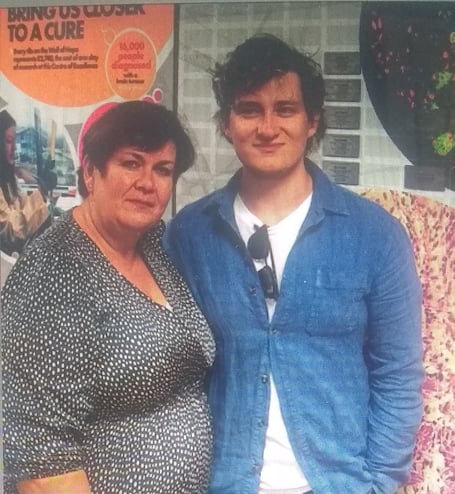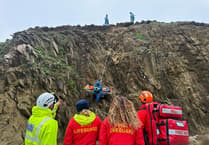A 23-year-old Kingsbridge man with an inoperable brain tumour has toured a research centre where scientists are striving to find a cure for the devastating disease.
Jack Carter was diagnosed with a meningioma brain tumour in December 2023 after experiencing problems with his left eye.
At first, doctors thought he was experiencing palsy in one eye, but a specialist at Derriford Hospital in Plymouth decided to send him for an MRI scan as a precaution.
His mother Charlotte Carter, who also lives in Kingsbridge, said: “It was a bit of a shock to say the least to find out Jack had a brain tumour. Since then, thankfully, the tumour has remained stable, but because it’s pressing on Jack’s optic nerve and is right by his pituitary gland and carotid artery, surgeons can’t risk removing it.”
Last Friday (March 1), Jack and Charlotte were invited to the Brain Tumour Research Centre of Excellence at the University of Plymouth, to learn about research which is exploring new ways to diagnose and treat meningioma – the most common low-grade brain tumour affecting adults – to help patients such as Jack in the future.
They were among supporters given the opportunity to tour the labs, led by principal investigator Professor Oliver Hanemann, and hear about recent breakthroughs from the centre which have included an innovative blood test which could be used to diagnose and monitor meningioma brain tumours, and the development of a new technique to grow tumour cells in the lab, which could improve the success of future clinical trials.
Charlotte added: “Jack has been amazing, with fantastic support from his lovely girlfriend Lucy, and his father and I are incredibly proud of how he has dealt with the situation. The tumour is not going to go away – there’s nothing we can do. He is continuing to learn to adjust to the changes in his life, including regular scans to monitor the tumour for growth. If that happens, there’s the option of radiotherapy treatment.
“Nevertheless, he’s totally focused on finding work in film and TV production.”
Long before Jack’s diagnosis, Charlotte has been a trustee of The Misses Barrie Charitable Trust which has been awarding grants since 2009 to Brain Tumour Research. The charity has four Centres of Excellence across the UK working to find a cure, including one at the University of Plymouth.
She said: “Since suddenly finding myself in the position of mum to a brain tumour patient, I am proud to say The Misses Barrie Charitable Trust, which had already granted more than £12,000 to Brain Tumour Research over the years, has committed to awarding the charity with £7,500 each year for the next three years to fund vital research.”
After touring the lab, Charlotte and Jack placed tiles on the Wall of Hope, recognising the fundraising support granted by the Misses Barrie Charitable Trust, as well as honouring Jack’s diagnosis and life with a brain tumour.
Charlotte said: “It was heartening to hear from the scientists about the work being done in their quest to find a cure,”
Visit www.braintumourresearch.org/fundraise/sponsor-a-day


-has-been-appointed-as-the-new-chair-of-Devon-County-Council-(Ima.jpeg?width=209&height=140&crop=209:145,smart&quality=75)


Comments
This article has no comments yet. Be the first to leave a comment.